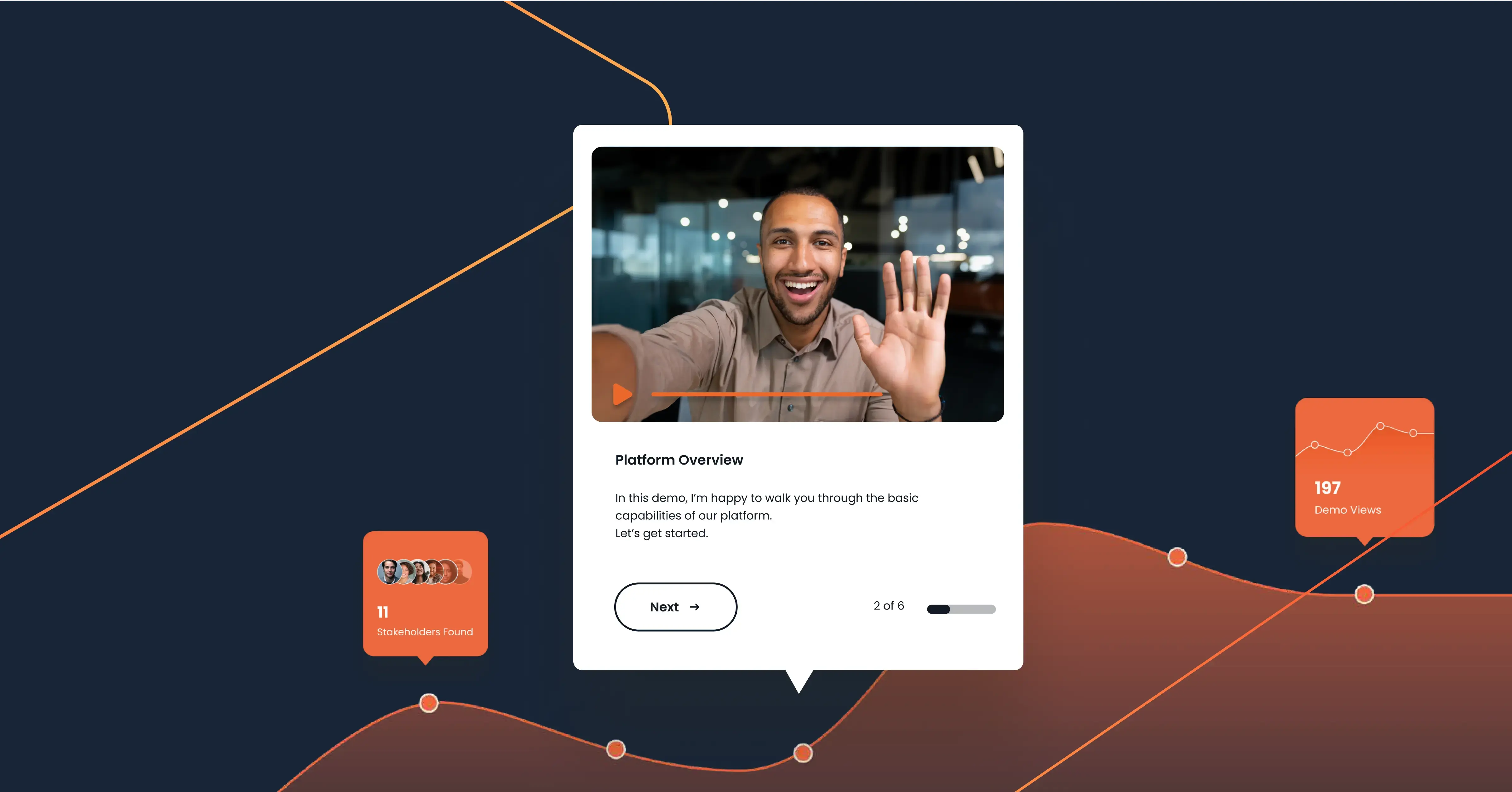Todd Janzen is a lifelong advocate for the Sales Engineering profession and a true engineer at ...
Close more deals with
Demo Automation.
Watch a Demo
Complex B2B sales aren’t just about relationships anymore – they’re about solving real technical problems for buyers who need more than a polished pitch.
Solutions engineers have emerged as the critical bridge between technical complexity and business value, transforming how companies sell sophisticated products and services. And with final purchasing decisions typically requiring alignment between at least five stakeholders with different priorities, solutions engineers are more important than ever for building consensus, translating needs across departments, and guiding buyers toward confident decisions.
In this article, we’ll explore the evolving role of solutions engineers, how they differ from related technical roles, and why they’ve become indispensable for modern B2B buyers. We’ll also examine the skills, career paths, and strategies that make solutions engineers successful in today’s exciting—but complex—buying environment.
What is a Solutions Engineer?
A solutions engineer is a technical expert who bridges the gap between sales and product, making it easier for buyers to understand how a complex solution can solve real business problems. They’re the ones who translate product capabilities into practical outcomes—like improving efficiency, cutting costs, or reducing risk—so everyone from IT teams to the CFO sees the value.
But the role isn’t just about technical know-how anymore. It’s evolved into a strategic function that directly impacts revenue. Today’s solutions engineers are part educator, part consultant, and part sales strategist. Think of them as “technical translators” who speak both engineering and business fluently, and know exactly when to switch dialects.
Throughout the sales process, solutions engineers work hand-in-hand with account executives to qualify opportunities, deliver tailored demos, and tackle objections before they become deal blockers. They know how to connect the dots between technical features and what really matters to a diverse buying committee: business impact, ease of adoption, and confidence in the solution.
Benefits of Having Solutions Engineers on Your Sales Team
Bringing solutions engineers into your sales team isn’t just a nice-to-have—it’s like upgrading from a flip phone to a smartphone. Suddenly, everything works better. These technical pros aren’t just around to click through product demos—they’re your secret weapon for turning complexity into clarity and hesitation into “Where do I sign?”
- Increased technical credibility: Solutions engineers establish trust by demonstrating deep technical knowledge that helps buyers feel confident in their purchasing decisions.
- Faster sales cycles: By quickly addressing technical objections and providing clear, accurate information, solutions engineers remove roadblocks that typically stall deals.
- Higher close rates: Teams with dedicated solutions engineers typically see higher win rates on complex deals, as technical expertise helps overcome objections more effectively and demonstrates value more convincingly.
- Larger deal sizes: Solutions engineers excel at identifying additional use cases and cross-selling opportunities that expand the initial scope, thereby expanding deal sizes.
- Better customer relationships: They ensure technical alignment between what’s sold and what’s delivered, reducing implementation challenges and setting the foundation for long-term success, leading to higher customer satisfaction and increased renewal rates.
As products get more complex and buying committees get more crowded, the strategic value of solutions engineers only grows. If you’re not putting their skills to work, you’re probably leaving deals (and dollars) on the table.
Solutions Engineer vs Software Engineer vs Sales Engineer
Solutions engineers, software engineers, and sales engineers each play distinct roles within technology organizations, though the collaboration between these three key team members can be highly beneficial for sales and revenue.

Solutions engineers typically place greater emphasis on designing comprehensive technical solutions that address specific customer challenges. Meanwhile, sales engineers may focus more narrowly on product demonstrations and technical support during the sales process, offering enablement and expertise to sales representatives and account executives.
Software engineers are generally less customer-facing, since they work internally to develop the product. However, they may collaborate with other positions, like solutions engineers, who can offer their buyer knowledge to help the software engineer optimize the product for customer needs.
There are also demo engineers, who specialize specifically in creating compelling product demonstrations rather than the full scope of technical sales support., and solution architects, who typically focus on more complex enterprise implementations and technical strategy.
Regardless of your role, demos provide valuable sales and buyer enablement. Product demos deliver personalized, interactive content that helps solutions engineers demonstrate value, sales engineers equip buyers with product knowledge, and software engineers share their latest product developments.
Responsibilities of a Solutions Engineer
From the first discovery call to post-sale handoff, solutions engineers are everywhere—translating tech-speak, calming nervous stakeholders, and making sure the solution actually solves something. They handle:
Technical discovery: Solutions engineers excel at uncovering customer technical requirements and challenges through thoughtful questioning and active listening. They identify pain points that may not be obvious to the customer and translate business objectives into technical requirements.
Solution design: Creating customized technical solutions that address specific customer needs is a core function of solutions engineers. They configure products, design integrations, and develop implementation plans tailored to each customer’s unique environment.
Product demonstrations: Solutions engineers showcase product capabilities aligned with customer use cases, focusing on features that solve specific problems rather than generic capabilities. Their demos tell a compelling story about how the solution delivers value in the customer’s context.
Proof of concept development: Building working examples of solutions for customer evaluation helps buyers visualize the value and reduce perceived risk. These hands-on experiences accelerate buying decisions by providing tangible evidence of capabilities.
Technical objection handling: Addressing complex technical questions during the sales process requires both depth of knowledge and communication skills. Solutions engineers anticipate concerns and prepare thorough, accurate responses that build confidence. The ability to handle objections effectively often makes the difference between winning and losing competitive deals.
Cross-functional collaboration: Working with product, engineering, and sales teams ensures alignment throughout the customer journey. Solutions engineers serve as the technical voice of the customer internally while representing the company’s capabilities externally. This bridge-building function is critical for maintaining trust and momentum.
Customer success support: Ensuring smooth handoff to implementation teams sets the foundation for long-term customer satisfaction. Solutions engineers document requirements, configurations, and customer expectations to facilitate seamless transitions. This continuity helps prevent the “expectation gaps” that often lead to implementation challenges.
Solutions Engineers & the Self-Guided Demo Movement
The traditional approach to product demos is undergoing a fundamental transformation, with solutions engineers leading this evolution toward buyer-led experiences.
Modern product experience platforms allow solutions engineers to create interactive demos, product tours, and automated simulations that buyers can explore on their own terms, scaling their influence beyond live meetings. By automating repetitive demos, capturing buyer intent data, and enabling prospects to self-educate, solutions engineers can focus on high-value activities like technical discovery and strategic consultations.
This evolution represents a win-win scenario:
- Buyer freedom: Prospects explore products on their own terms and timeline
- Expanded reach: Solutions engineers scale their impact across more opportunities
- Better qualification: Intent data reveals prospect interests and priorities
- Reduced friction: Eliminating scheduling delays accelerates the sales process
- Consistent messaging: Ensures all prospects receive accurate, approved information
This shift toward buyer-led discovery has made Product Experience Platforms like Consensus a strategic asset for modern solutions engineering teams. It provides a full-funnel product experience that can engage the three senses that buyers use to buy digital things: sight, sound, and feel. In doing so, it doesn’t just show the product—it creates an immersive, scalable, data-rich product journey that’s tailored to each buyer’s unique priorities.
Here’s how it works:
- Watching: Watching lets buyers use one of the core senses they use for digital purchases: sight. When a potential customer watches engaging content focused on your product, like a preconfigured demo created with demo automation software, they receive an in-depth, personalized overview that lets them get their first taste of just what you offer.
- Trying: Trying enables your potential buyers to begin interacting with your product. This step goes beyond sight, adding sound and feel. By using tools like engaging product tours, your buyers get a guided tour of your platform, letting them learn about your product, specifically the features that they need the most, in a hands-on way.
- Exploring: Exploring lets your buyers wander through your product on their own. Now is the time for them to fully unpack the diverse capabilities of your solution through tools like product simulations.
- Tracking: Tracking is another vital part of product experience management. Your sellers need to understand what’s working and what isn’t working with their product experience to be able to improve it and better address buyer needs. Think of product experience as a cycle. Proper ranking, such as through Consensus’ Demolytics, enables the cycle to start again, better than before.

How to Become a Solutions Engineer
Transitioning into a solutions engineering role offers an exciting career path for those who enjoy combining technical knowledge with customer-facing responsibilities. The journey typically involves developing both technical foundations and consultative selling skills.
Education
Most solutions engineers start with formal education in technical disciplines, though the specific requirements vary by industry and company. Common educational backgrounds include:
- Bachelor’s degrees in computer science, engineering, information technology, or related technical fields provide the foundation for understanding complex systems and technologies
- Business courses complement technical knowledge by developing economic thinking and communication skills essential for customer interactions
- Industry-specific certifications demonstrate specialized expertise in relevant technologies, platforms, or methodologies
While a technical degree provides valuable background knowledge, companies increasingly value practical experience and communication abilities alongside formal education. Many successful solutions engineers come from diverse academic backgrounds but share a passion for technology and problem-solving.
Technical Skills
Our 2025 Sales Engineering Compensation & Workload Report found that the core tasks sales and solutions engineers focus on are product knowledge improvement, discovery, and technical demos. They need a versatile technical toolkit that enables them to understand product capabilities, customer environments, and integration requirements, including:
- Programming fundamentals: Ability to understand code, customize demos, and communicate with development teams
- Cloud infrastructure knowledge: Understanding of cloud-based delivery models and deployment options
- Database concepts: Knowledge of data structures, integration points, and migration considerations
- API understanding: Ability to explain how systems connect and exchange information
- Security principles: Addressing customer concerns about data protection and compliance
- Product-specific expertise: Deep knowledge of the solutions they represent
- Demo creation abilities: Skills to showcase product capabilities in compelling, relevant ways
Soft Skills
While technical capabilities form the foundation, soft skills often differentiate exceptional solutions engineers from merely competent ones. Critical interpersonal abilities include:
- Communication skills: Translating technical concepts for non-technical audiences and explaining complex ideas clearly
- Presentation abilities: Engaging audiences and maintaining attention during demonstrations
- Problem-solving approach: Focusing on business outcomes rather than technical specifications
- Consultative selling techniques: Uncovering needs and aligning solutions to customer priorities
- Active listening: Understanding unstated requirements and concerns
- Relationship building: Connecting with diverse stakeholder groups with varying technical backgrounds
Great solutions engineers don’t just build demos, they build trust. They’re equal parts tech-savvy and people-savvy, making them the kind of unicorn who can explain an API to an engineer and then turn around and pitch business value to a CFO—without breaking a sweat.
Gaining Experience
For those interested in becoming solutions engineers, practical experience proves invaluable in developing the necessary skills and knowledge. According to our 2025 Sales Engineering Compensation & Workload Report, presales professionals, like solutions engineers and sales engineers, typically have about eight years of experience.
Aspiring solutions engineers can take several approaches to gain relevant experience:
- Starting in technical support or customer success roles provides exposure to customer challenges and product capabilities
- Building a portfolio of sample demos or solutions demonstrates capabilities to potential employers
- Networking with current solutions engineers offers insights into day-to-day responsibilities and career paths
- Participating in presales communities and forums connects you with peers and mentors who can provide guidance
Many solutions engineers transition from adjacent roles like implementation consultants, customer success managers, or technical support specialists. These positions provide valuable customer interaction experience while developing product knowledge.
Earning Potential and Career Outlook
Entry-level solutions engineers typically earn about $80,000 annually, depending on location, industry, and prior experience. Mid-career professionals with five to nine years of experience can expect salaries closer to $100,000, while senior solutions engineers with specialized expertise command around $120,000.
Regional variations significantly impact compensation, with technology hubs like San Francisco, New York, and Seattle offering premium salaries to attract top talent. Industries also influence earning potential, with enterprise software, cybersecurity, and cloud infrastructure typically providing higher compensation than other sectors.
Our 2025 Sales Engineering Compensation & Workload Benchmark Report reveals that solutions and sales engineers earn an average of about $124,000, plus about $43,000 in commissions. This variable compensation directly ties their efforts to business outcomes and rewards their contribution to revenue generation.
However, it’s worth noting that the report also found that sales and solutions engineers want a more comprehensive benefits package than they are typically offered, one that matches the incentives sales teams often receive.

Career progression opportunities for solutions engineers include several attractive paths:
- Advancement to senior solutions engineer roles with greater autonomy and higher compensation
- Management paths leading teams of solutions engineers and shaping presales strategy
- Adjacent roles in solutions architecture, product management, or customer success
- Executive positions like Chief Technology Officer or VP of Presales for those with leadership ambitions
The combination of strong compensation, diverse career paths, and robust market demand makes solutions engineering an attractive profession for technically-minded professionals who enjoy customer interaction and problem-solving.
Discover the Impact of Solutions Engineers For Your Business
Smart companies aren’t just hiring more solutions engineers—they’re giving them superpowers. That’s where Consensus comes in. Its Product Experience Platform helps SEs scale their impact by delivering personalized, interactive demos that engage buyers before the first meeting—and keep the momentum going long after.
Instead of waiting days to get on someone’s calendar, buyers can dive into on-demand demos the moment they raise a hand. It’s like handing them the keys to the product while you’re prepping your next call. The platform eliminates friction and supports solutions engineers by:
- Turning Interest into Action: Forget the slow dance of scheduling intro demos. With Consensus, curious prospects get instant, personalized walkthroughs the second they engage. That means less waiting, more wow-ing—and sales cycles that move at the speed of buyer interest.
- Selling Between Meetings: Deals don’t have to stall just because you’re in another meeting. Consensus keeps the conversation going with interactive tours and demos that buyers can explore whenever they want. It’s the end of “Sorry, I missed the meeting”—and the beginning of real stakeholder alignment.
- Uncovering Hidden Stakeholders & Buying Signals: With Demolytics, you see it all—who’s watching, what they’re clicking, and what they care about. You’ll spot silent influencers, catch objections before they derail things, and always know the perfect time to follow up. (It’s like a sales radar, but smarter.)
The future of B2B sales belongs to companies that enable their solutions engineers with the tools, training, and technology to guide buyers confidently through complex purchasing decisions. The result? Shorter sales cycles, bigger deals, and happier customer relationships.
Empower your solutions engineers with Consensus.
Solutions Engineering FAQs





